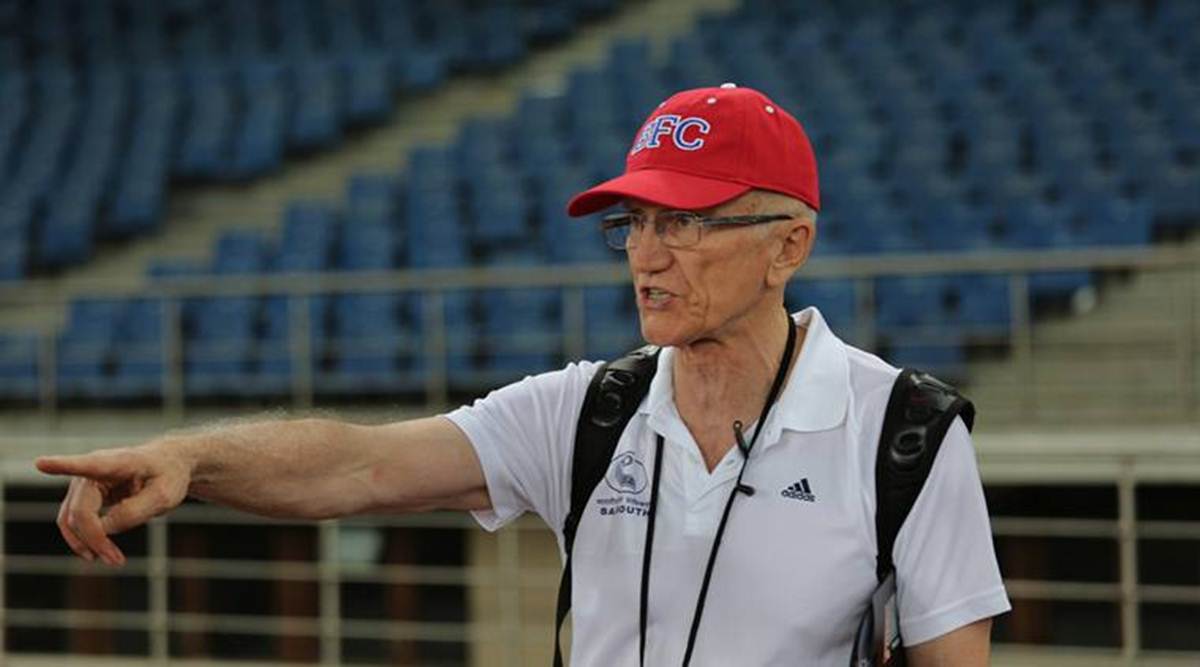 Nikolai Snesarev (File Photo)
Nikolai Snesarev (File Photo) Coach Nikolai Snesarev, the tough taskmaster credited for the success of women distance runners at the 2010 Asian Games in Guangzhou and the Commonwealth Games in New Delhi, passed away in his room at the National Institute of Sports in Patiala on Friday. He was 72.
Snesarev first coached Indian athletes in 2005 and his proudest moment came five years later when Preeja Sreedharan and Kavita Raut won gold and silver respectively in the 10,000 metres and Sudha Singh took the steeplechase gold at Guangzhou. At the 2016 Rio Olympics, Lalitha Babar, also trained by Snesarev, reached the final of the steeplechase, a first for an Indian track athlete since PT Usha 32 years earlier.
“We are stunned by the news that coach Nikolai was found dead in his room today. He returned to India only a few days ago, having agreed to train steeplechaser Avinash Sable for the Olympic Games in Tokyo. We will cherish his long association with Indian athletics and will miss him,” Athletics Federation of India president Adille Sumariwala said.
Tough love
Only those ready for the grind were able to train with the man from Minsk, Belarus. He got Indian athletes to stick to a boiled-vegetable-and-chicken-soup diet, told them to fast on their weekly off till dinner, rationed mobile phone usage to one or two calls a week, asked them to shun supplements, and made them train till they were ready to fall. His word was final, as Raut attested.
“After I won bronze in the 10,000 metres at the Commonwealth Games in Delhi, he didn’t allow me to leave the camp. It was a huge moment for me and the country. I was being invited for many felicitation functions. One organiser was even ready to fly me up and down in a helicopter. But Nikolai sir said nothing doing. He told me ‘this is not the time to celebrate this medal because if you do, you will lose focus and time’. A few months later, I won a silver at the Asian Games. Every single medal I have achieved from 2006 to 2014 is because of him. Without his coaching and care, there would be no success for me,” Raut said on Friday.
Most athletes accepted the tough love because it came with the guarantee of an international medal. Moreover, Snesarev put in as much effort as the athletes he trained.
“When we travelled for training or competition, Nikolai sir would put our shoes and training equipment into our bags. They were heavy but he lugged our bags on his shoulders. Even if we had to travel by autorickshaw or bus he would carry the bags,” Raut said.
Even after an athlete had moved on, Snesarev kept in touch. When he met Raut’s husband for the first time in 2015, Snesarev spoke like a father who had given his daughter’s hand in marriage.
“He told my husband, ‘I looked after her and took care of her for 10 years. I was like her mother and father. Now you have to look after her as well as I did’. When I became a mother three years ago, he would message on Facebook to enquire about how me and my child were doing,” Raut said.
Attention to detail
Snesarev, Raut believed, was coach, nutritionist and life coach rolled into one. Every morsel of food the athletes ate and every sip they took had to be cleared by him. “He would not allow us to even have a recovery drink after a training session. He wanted us to consume only things that were natural. So he would mix lemon juice, a little honey and warm water and give it to us at the ground. He would taste it first and then give it to us,” she recalled.
Athletes Snesarev trained had to get used to aches and pains because any sort of painkillers or approved medicines were banned. “He felt if we took any sort of medication, it would slow down our recovery. He wanted us to consume natural substances. Everything we ate had to be made in front of him or after being cleared by him. Boiled fish, boiled chicken without any spices and boiled vegetables, and a soup is what he made us eat every day. Only a little salt was allowed. It was not easy to train under him, but it was rewarding. And he really cared about the well-being of the athletes he trained.”
No cheat days were allowed. On Sunday, a weekly off, which followed a heavy day of training, athletes had to fast till late evening. “His theory was that fasting would help us recover faster,” Raut says.
Athletes had very little contact with the outside world and were largely confined to their training venue and place of stay. “We had to hand over our mobile phones to him and were allowed to use them only to make essential calls, that too during an allotted period,” Raut added.
Like Raut, Sudha too was shocked to hear about the demise of the coach who guided her to Asian Games glory.
“From A to Z, he did everything for us. He fought for five-star accommodation for us when we travelled, comfortable travel. He put our needs before his. Athletes were his priority. In return, he demanded complete dedication. You could come five minutes early for practice but if you were a minute late, then life could get tough,” she said.
Sudha, scheduled to compete in a marathon in New Delhi on Sunday, was looking forward to catching up with Snesarev. “We chatted briefly after he came to India recently. For me and other athletes like Kavita and Preeja, he was like a supreme guru. To attain blessings of a guru you have to make sacrifices but every one of them is worth it.”